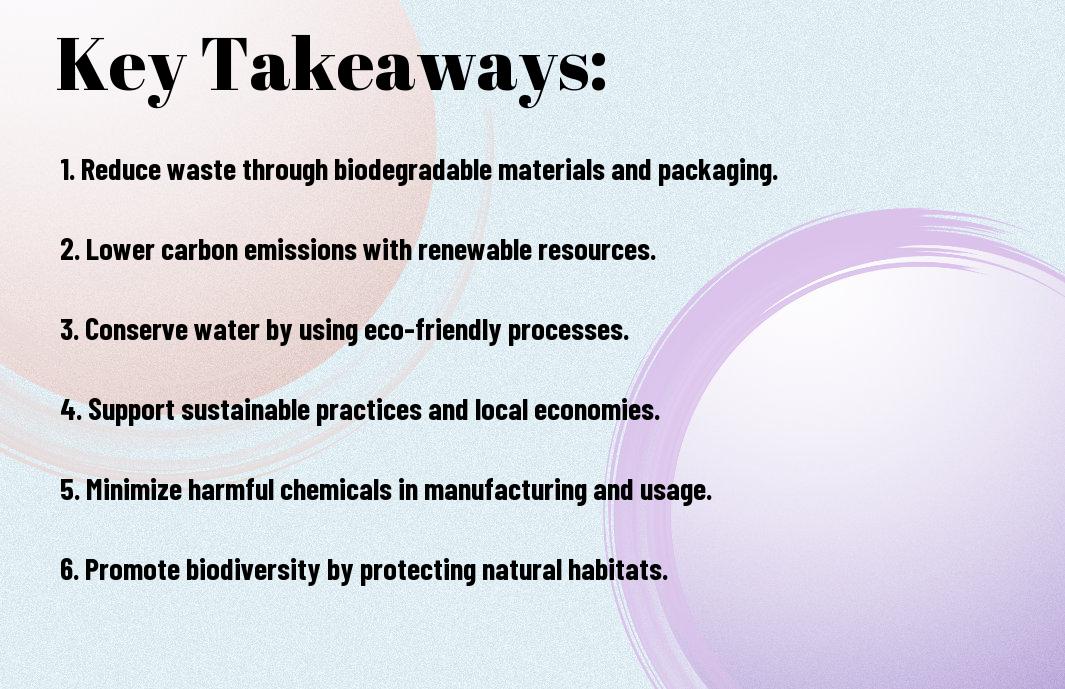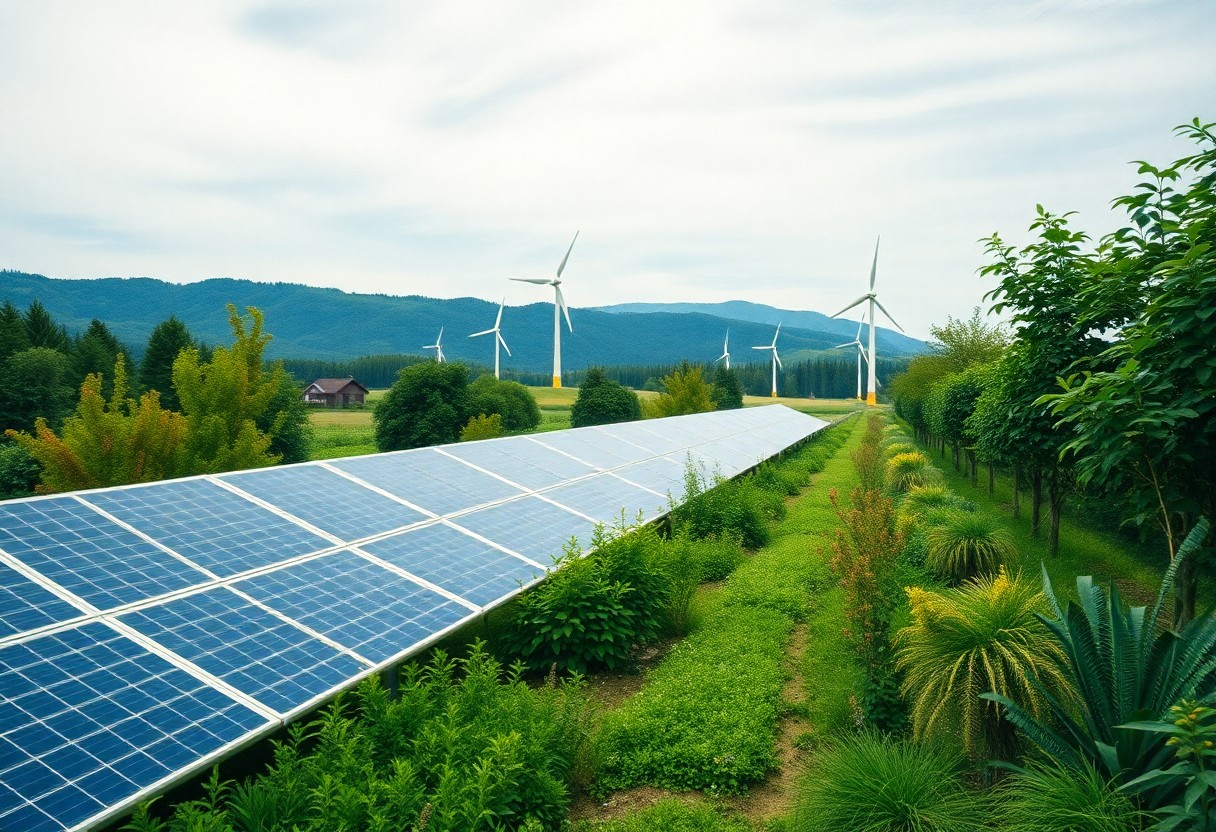As you consider the impact of your daily choices on the planet, you may wonder how your decisions affect the environment. Your use of green products can significantly reduce your ecological footprint, mitigating the harm caused by human activities. By choosing eco-friendly options, you contribute to a healthier planet, conserving natural resources and decreasing pollution. This, in turn, helps to preserve the delicate balance of ecosystems, ensuring a sustainable future for generations to come, and it starts with the choices you make every day.
Key Takeaways:
- Using eco-friendly products helps to reduce the amount of waste and pollution in the environment, which in turn helps to protect wildlife and their habitats.
- Sustainable products are designed to be reusable and biodegradable, which decreases the need for single-use products and helps to conserve natural resources.
- Green products promote energy efficiency and help to lower greenhouse gas emissions, which contributes to a healthier planet and helps to combat climate change.
- Purchasing environmentally responsible products supports companies that prioritize environmental stewardship and encourages other businesses to follow suit, creating a positive impact on the environment.
- By choosing green products, individuals can make a significant difference in their daily lives and contribute to a larger movement towards a more sustainable future for the planet.
Benefits of Green Products
A significant advantage of using green products is that they have a positive impact on the environment. You can learn more about The Importance of Eco-Friendly Products in Reducing Environmental Impact and how you can make a difference by choosing eco-friendly options.
Reduction of Pollution
On a daily basis, you are exposed to various pollutants that can harm your health and the environment. By opting for green products, you can significantly reduce your exposure to toxic substances and decrease the amount of waste that ends up in landfills and oceans.
Conservation of Natural Resources
By making conscious choices, you can help preserve the natural world for future generations. You can start by choosing products that are sustainably sourced and have minimal packaging, which will help reduce the demand on natural resources.
Conservation of natural resources is a vital step towards creating a healthier planet. As you continue to make eco-friendly choices, you will be contributing to the preservation of forests, water sources, and wildlife habitats, ensuring that your actions have a positive impact on the environment and your own well-being.

Impact on Climate Change
Assuming you are concerned about the well-being of the planet, using green products can significantly help reduce your carbon footprint, ultimately contributing to a decrease in climate change.
Decrease in Greenhouse Gas Emissions
Around the globe, the shift towards green products has led to a noticeable reduction in greenhouse gas emissions, which you can be a part of by making conscious choices in your daily life.
Promotion of Sustainable Practices
Sustainable living is at the heart of the green product movement, and as you adopt these products, you are promoting a lifestyle that values the well-being of the environment and conserves natural resources for future generations.
In fact, as you continue to choose green products, you will find that your daily habits and routines become more mindful of the environment, influencing those around you to do the same, and collectively creating a significant positive impact on the health of our planet.
Role of Green Products in Waste Management
After adopting green products, you will notice a significant impact on the environment, particularly in waste management, as they are designed to reduce, reuse, and recycle, ultimately decreasing the amount of waste that ends up in landfills and oceans.
Reduction of Waste Disposal
For your part in reducing waste disposal, using green products is an effective way to minimize the amount of trash you generate, and by doing so, you contribute to a cleaner and healthier environment for yourself and future generations.
Increased Recycling and Reuse
Waste reduction is closely tied to increased recycling and reuse, and as you make the switch to green products, you will find that many of them are made from recycled materials or are designed to be recycled, which helps to conserve natural resources and decrease pollution.
For instance, when you choose products with minimal packaging or those that use biodegradable materials, you are supporting a system that values recycling and reuse, and this, in turn, helps to decrease the amount of waste that ends up in landfills, reducing greenhouse gas emissions and helping to mitigate the effects of climate change, which ultimately benefits your community and the planet as a whole.

Health Benefits of Green Products
Once again, your choice of products can have a significant impact on your well-being, as green products provide a healthier alternative to traditional ones, reducing your exposure to harmful substances and promoting a better quality of life.
Reduction of Toxic Chemicals
Among the numerous advantages of green products, one of the most significant is the decrease in toxic chemicals used in their production, which in turn reduces the risk of diseases and health problems that you may face.
Improvement of Air and Water Quality
Decreasing pollution is a key benefit of using green products, as they produce fewer emissions and waste, resulting in cleaner air and water, which is vital for your health and the health of your surroundings.
And as you continue to choose green products, you will notice a significant improvement in the air and water quality around you, allowing you to breathe easier and live a healthier life, free from the negative impacts of pollution and toxic substances that can harm your well-being and the environment.
Economic Benefits of Green Products
Now, as you consider the impact of your purchasing decisions, you’ll find that green products offer numerous economic benefits, from reducing your expenses to contributing to a more sustainable future.
Cost-Effective Solutions
Along with the environmental advantages, you’ll discover that green products often provide cost-effective solutions, helping you save money in the long run by reducing your energy consumption and waste.
Job Creation and Economic Growth
About the economic benefits of green products, you’ll be interested to know that they can lead to job creation and economic growth, as companies invest in sustainable practices and technologies.
The jobs created in the green industry can have a positive impact on your community, as you see local businesses thrive and new opportunities emerge, ultimately contributing to a more sustainable and prosperous economy for you and future generations.
Challenges and Limitations
All green products are not created equal, and you may encounter some obstacles when trying to make eco-friendly choices. As you consider switching to green products, you should be aware of the potential drawbacks.
Higher Costs of Green Products
To make the switch to green products, you will likely need to pay a premium, as eco-friendly options are often more expensive than their traditional counterparts, which can be a significant barrier for you, especially if you are on a tight budget.
Limited Availability and Accessibility
Accessibility to green products can be a major issue, as you may not find them in your local stores or online, making it difficult for you to make sustainable choices.
At the moment, you may need to go out of your way to find stores that carry green products or shop online, which can be inconvenient and may deter you from making the switch to eco-friendly options, but as demand grows, availability and accessibility are likely to improve, allowing you to make more informed choices about the products you use.
Summing up
The choices you make can significantly impact the health of your planet. By opting for green products, you reduce your reliance on toxic substances and lower your carbon footprint. As you continue to make environmentally conscious decisions, you contribute to a larger movement that protects your air, water, and soil, ultimately preserving the delicate balance of your ecosystem for future generations.
FAQ
Q: What are green products and how do they help reduce pollution?
A: Green products are made from environmentally friendly materials, designed to minimize waste and reduce pollution. These products help reduce the amount of toxic chemicals released into the air, water, and soil, which in turn helps to preserve natural habitats and protect wildlife. By choosing green products, consumers can significantly decrease their carbon footprint and contribute to a cleaner, healthier environment.
Q: How do green products contribute to conserving natural resources?
A: Green products are typically made using sustainable materials and production methods, which help to conserve natural resources such as water, energy, and land. For example, products made from recycled materials reduce the need for virgin materials, while energy-efficient products decrease the demand for fossil fuels. By conserving natural resources, green products help to prolong the life of ecosystems, maintain biodiversity, and ensure a sustainable future for generations to come.
Q: Can using green products really make a significant impact on climate change?
A: Yes, using green products can play a significant role in mitigating climate change. By reducing greenhouse gas emissions, decreasing energy consumption, and promoting sustainable practices, green products can help to slow down global warming. Additionally, the production and disposal of green products often involve closed-loop systems, where materials are constantly cycled back into production, reducing waste and the environmental harm associated with it. As more consumers choose green products, the collective impact can be substantial, driving a shift towards a more sustainable and environmentally conscious economy.

